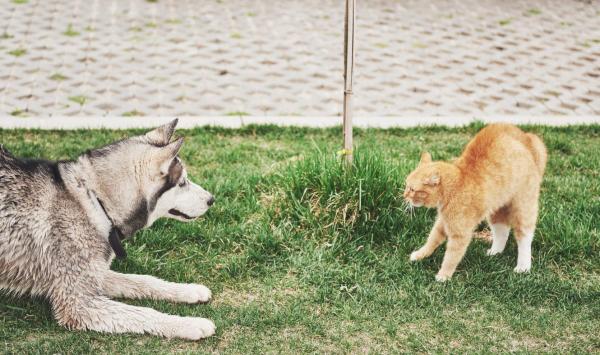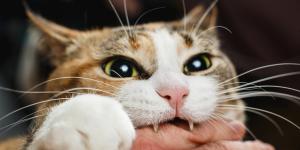Why Does My Dog Hate Cats?



See files for Dogs
It has always been believed that rivalry between dogs and cats is a natural thing. Surely you have heard more than once the expression "they quarrel like cats and dogs" to describe two people who fight often. But is it true that these two animals hate each other? When two animals as different as dogs and cats live together in the same space, it's not uncommon for tension and conflict to arise between them. Nevertheless, you can do a number of things to help them form a strong bond and eventually become good friends.
In this AnimalWised article, we look into all the possible causes for this behavior and tell you whether dogs and cats truly hate each other.
Is it true that dogs and cats don't get along?
By nature, no species of animal gets along badly with another, since the relationship between two individuals depends on many factors, not only on the species to which they belong. Therefore, it would be wrong to generalize and say that dogs and cats do not like each other and cannot live together peacefully.
While both animals have many aspects in common, they also differ in others that make their interaction more difficult. Dogs are social mammals, they live in groups, they establish social norms and in some ways depend on each other to survive and have a good quality of life. In contrast, cats are much more independent. While they sometimes form stable coexistence groups, they are not as dependent on each other or other species.
It is not always easy for dogs and cats to understand each other or interpret each other's intentions because they communicate and interact in different ways. While these differences can lead to distrust or suspicion, it does not necessarily mean that dogs and cats will never accept each other, even if they live together. Much like humans, they can learn to tolerate each other's presence, communicate effectively, and even form a friendship of sorts.
In case you intend to have both a dog and a cat, you might find this article useful. The following tips will help ensure that both animals live peacefully at home.

Why does my dog hate cats and chase them?
If you are wondering why dogs chase, bark at, growl at, or get overly excited every time they see a cat, it does not mean they hate them just because they are cats! There are several causes that can explain this behavior. These are the most common ones:
Your dog has never socialized with cats or is not used to being around cats
It is quite possible for a dog to overreact in the presence of a cat if it has never been exposed to cats during its sensitive socialization period, which is between three weeks and three months. Another explanation is that the dog has not yet gone through a habituation process. Sometimes the dog's behavior is simply the result of the curiosity it feels for this animal it is not used to seeing. In other cases, it is related to a feeling of fear and uncertainty in the face of the unknown. Not all dogs express their fear in the same way. Some freeze, others run or hide, and many bark, growl, bristle, or even chase the potential threat away.
Your dog has had negative experiences with cats in the past
Another possible reason your dog seems to hate cats could be related to a traumatic or unpleasant experience dealing with cats. Dogs that are used to being around cats are usually curious, fearless, or overly trusting of cats. They might even cross their path and approach them intrusively to sniff or play with them. If the cat in question feels threatened, it may attack the dog with its claws or teeth, frightening or injuring it. As a result, it is possible that from that moment on the dog associates the presence of cats with a negative experience and therefore reacts to them in an undesirable way.
Hunting instincts are highly developed in your dog
Dogs of all breeds have the desire to hunt, as they are predominantly carnivores and have a common ancestor: the wolf. Hunting consists of several behaviors that always occur in the same order: the search, the stalk, the pursuit, and finally the attack that kills the prey. In certain breeds, these instincts have been improved and refined over the years through selective breeding. The result, for example, is dogs that have an excellent sense of smell and specialize in finding and tracking targets, or dogs that have innate stalking behavior, or sprint dogs that can outrun a rabbit at a run. It's also important to consider genetics if your dog chases or follows cats. So if your dog is killing cats, chasing them, and viciously attacking them, it is likely that genetics is a determining factor.
The socialization period is extremely important for a dog, and if it is not done properly, it can lead to behavior issues in the future. To avoid these problems, continue reading this article on socializing puppies and adult dogs.
How can I make my dog stop hating cats?
To change your dog's behavior, you must first correctly identify the cause and understand the emotion behind it. In spite of the fact that your dog's behavior may partly be genetic, there are exercises that you can do together to make them more tolerant of cats.
We offer some guidelines in this article on how to work with your dog to improve their relationship with cats. But as always, if you are concerned about this or any other behavior, we recommend that you seek the advice of a professional dog ethologist or educator. Your dog's case will be thoroughly investigated and handled in a professional way.
How to make my dog not hate street cats?
The relationship a dog establishes with each individual is unique and different. This explains why a dog that lives at home with a cat without problems may react explosively to unknown cats they find on the street. You should get your dog used to the presence of cats, especially if you live in an area where it is easy to find them on your walks. Start by keeping as much distance as possible from any cats you encounter, even if you have to change your route or turn back. It is harder to get your dog used to cats and ignore them when they are within reach.
As soon as your dog sees a cat, slow down and try to draw their attention to you before he reacts disproportionately by saying his name or giving a command. The moment the dog turns his ear or eyes to you, say "Very good!" and reinforce them. After that, walk away from the cat.
The goal of this exercise is to gradually establish an association between the cats and the reinforcer by asking the dog to ignore the cat in exchange for something they like. Of course, we must keep in mind that, on many occasions, especially for dogs with a strong hunting instinct, these are far stronger than anything we can feed them. In this case, a good option is to use a game as a reinforcer to allow them to satisfy their hunting instinct, such as throwing a ball in the opposite direction.
Never punish or yell at your dog when they react to a cat, and avoid sharp, sudden jerks on the leash, as these can make the situation worse. Remember that behavior modification is a slow process that requires patience and it is normal for relapses to occur.
How to make my dog not hate my cat?
For a dog, living with a cat is a big change in their life and not all dogs seem to be happy with it. Often there are conflicts that the caretakers do not understand or cannot solve, which in most cases can be prevented by a good mediation between the two animals.The animal adjustment process can be lengthy, but you should avoid forcing any type of interaction between them if one of the animals is not comfortable. Here are some tips to make cohabitation easier:
- During the first days, delineate both animals' spaces with physical barriers and make sure they both have areas where they can rest in peace.
- Offer both animals items soaked in each other's scent to get them used to it. Gradually allow them to see or approach each other when they are calm, always maintaining safety measures.
- Remain calm during your interactions, do not try to raise your voice or make sudden movements.
- Make sure the cat has access to high places, these will make them feel safer.
- Give equal attention to both animals and reinforce any positive interaction between them.
- Train your dog in self-control exercises to prevent them from constantly chasing the cat around the house, provide him with enough physical and environmental enrichment, and play with them to satisfy their hunting instincts.
If, despite implementing all these tips, you find that your dog continues to hate cats, we recommend that you consult an ethologist or dog trainer.
You can also find that cats have a hard time accepting the presence of other cats in their space, if you are interested in this topic, keep reading this article on how long does it take for two cats to get along?
If you want to read similar articles to Why Does My Dog Hate Cats?, we recommend you visit our Behavioral problems category.






